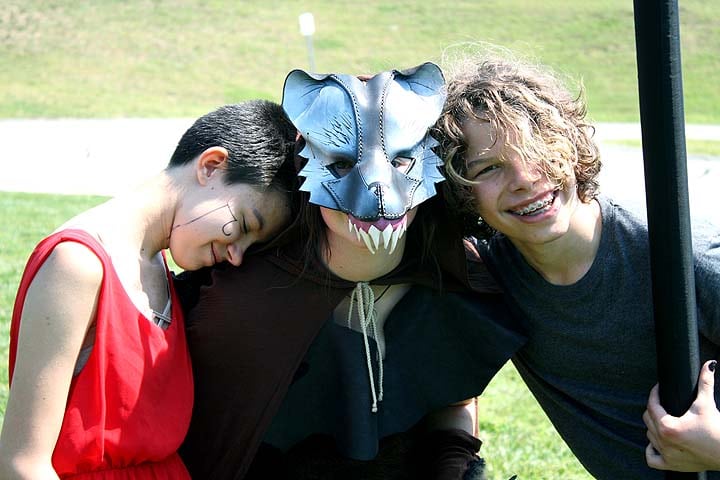
How to Staff for a Children’s LARP
Live Action Role Playing (LARP) tailored for children requires a cohort of staff members who are not just guides but also imaginers, educators, and guardians of what can possibly be a transformative experience. The success of a LARP hinges on the team behind it—those who can turn a simple game into a rich, educational narrative. Below are the ideal qualities your staff members should possess and the training necessary to prepare them for the unique challenges of a children’s LARP.
Desirable Attributes in LARP Staff
The first attribute to seek in potential staff members is a genuine enthusiasm for role-playing and storytelling. Enthusiastic guides can make the difference between a memorable LARP and a forgettable game. Consider a candidate who lights up when discussing their favorite storybook or who has a penchant for dramatic flair—this natural inclination towards storytelling can keep children captivated.
Secondly, experience with children is invaluable. A candidate who previously worked as a summer camp counselor, where they orchestrated group activities and mediated the occasional squabble. This is a person who knows how to communicate at a child’s level and maintain engagement, even with a diverse group. We have a saying that a person who can work with kids, also knows how to work with adults. But not necessarily the other way around.
The ability to think on your feet is another important skill – improvisation skills are a must. Imagine a scenario where the planned story takes a turn due to the unpredictable input of a child. A staff member skilled in improvisation can seamlessly weave this input into the narrative, enriching the experience and even creating a sense of agency for the child.
Patience and adaptability are non-negotiable. Children’s energy levels and attention spans can be highly variable. A staff member must remain patient and adaptable, able to switch from a high energy outdoor chase scene to a quiet indoor puzzle-solving session as the situation demands.
Lastly, a deep understanding of safety and boundaries is critical. LARP activities should be fun but never at the expense of safety. An ideal candidate is someone who can assertively but kindly set clear rules and boundaries without dampening the adventurous spirit of the game.
Experience to Look for in Candidates
When looking for the right candidates, a background in education or child development can be a significant asset. These individuals bring an understanding of educational pedagogies that can be leveraged to create learning moments within the LARP. For example, a candidate with a background in science education may expertly weave in a lesson on ecology while the children are on a quest through the “enchanted forest.”
Theatrical or performance experience can also be extremely beneficial. Those who have stood on a stage know how to command an audience’s attention and can make a scripted role feel alive. They can don a costume and not just play a part but become it, convincing the children of the reality of the world they’ve entered.
With the above in mind, we have found that applicants who have a degree in Theater Education are the best candidates. They tend to have experience working with children, improv skills for theater, and knowledge on how to integrate education into the experience.
Having a current or event past first-aid certification or the willingness to obtain it is another practical requirement. Accidents, though rare and minor, can happen, and having staff on hand who can provide immediate care is essential.
Experience in roleplaying games or LARPing can be beneficial for understanding concepts like story arcs and solid game play. However, we have found that this is only applicable if the candidate has sufficient experience playing with children in the age demographic of the LARP you are seeking to create. See above about experience working with adults is not the same as experience working with kids.
Training Strategies for LARP Staff
Training should begin with a child-centric approach, ensuring that staff are equipped to create an environment where every child feels valued. For instance, role-playing exercises during training can prepare staff for the wide array of questions and scenarios they might face, from a shy child reluctant to participate to an overzealous participant who tries to dominate the play.
A comprehensive safety and emergency response training program is also vital. This training should cover everything from basic first aid to conflict resolution, with regular role-playing drills to ensure that all staff members know how to respond swiftly and effectively in various situations.
Character and story development workshops can serve as a creative incubator for staff, allowing them to craft compelling characters and plots. Staff could, for example, be tasked with developing backstories for their characters that weave educational elements into the lore of the LARP world.
Effective behavior management is another crucial aspect of training. Staff should be equipped with strategies to manage large groups of children, maintaining engagement and focus without stifling fun. They should learn to recognize signs of distress or exclusion among participants and intervene in a manner that supports positive group dynamics.
Finally, inclusivity and sensitivity training is necessary to ensure all children, regardless of their background or abilities, can enjoy the LARP to its fullest. Staff should be trained to be mindful of cultural sensitivities, to support children with special needs, and to foster an atmosphere of acceptance and encouragement.
It may sound like a lot to consider when you are hiring people for a LARP for children. But the right staff can make such a difference in the experience and the memories of the participants. Truly interactive, person-to-person activities are the most ripe for a transformative experience while reminding us of the importance of connecting with each other.
can lay a solid foundation for a successful and memorable event, while also optimizing resources and minimizing risks.
Guardian Adventures provides consulting and program development for museum and science centers, summer camps, amusement & attraction industries, and more.
